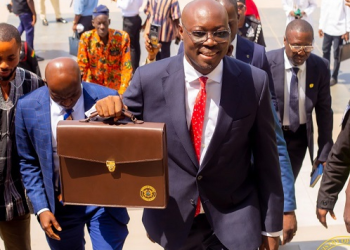The Minister for Lands & Natural Resources, Emmanuel Armah‑Kofi Buah has inaugurated an investor selection committee put together by the Ghana Integrated Aluminium Development Corporation (GIADEC) under the guidance and direction of the Ministry.
The Committee is tasked to evaluate and recommend a strategic partner from the pool of proposals received from investors by GIADEC for the VALCO modernization and the building of Ghana’s first alumina plant.
Delivering the keynote address, Hon. Buah emphasized that the development of the alumina refinery and the modernization of the VALCO smelter represents two cornerstone projects in Ghana’s broader industrialization agenda. Together, they signal the country’s determination to move decisively from a bauxite resource-exporting economy to one that processes and and adds value; he added.
“These two projects are interdependent and mutually reinforcing. The refinery will feed the smelter, the smelter will anchor downstream aluminium manufacturing, and together they will drive the emergence of broader industrial clusters supported by logistics, power, rail, and port infrastructure. The transformational agenda is clear: We must movefrom raw-material export to value addition; from mine and export to process and manufacture and export”.
He further noted that President Mahama’s reset agenda involves taking bold steps toward integrating Ghana’s aluminium value chain, starting with the VALCO modernization and alumina refinery development projects; a vision first championed by Ghana’s first President, Dr. Kwame Nkrumah. Mr. Buah stressed that the ongoing work of GIADEC in developing the Integrated Aluminium Industry (IAI) will massively transform the Ghanaian economy and create thousands of jobs for the Ghanaian people.
The committee, according to the Minister, has been carefully constituted to evaluate the proposals from prospective investors and recommend the most suitable partner(s) who bring not only capital, but also technology, technical expertise, local capacity-building, environmentally responsible practices, and a shared commitment to Ghana’s long-term prosperity.
The Acting Chief Executive Officer of GIADEC, Reindorf Twumasi Ankrah, on his part reaffirmed GIADEC’s commitment to providing the necessary support to the committee for a seamless execution of their mandate.
He further stated that he is encouraged by the strong interest shown by reputable investors from across the world since he assumed office. He further stressed that, this massive show of interest, is a clear indication of investor confidence in President John Dramani Mahama’s management of Ghana.
The Minister stressed that the selection process will be transparent, merit-based, and aligned with national interests, ensuring that it upholds the integrity of Ghana’s lands, minerals, environment, and host communities.
Background
Ghana embarked on the path to develop an Integrated Aluminium Industry (IAI) many decades ago but due to some challenges such a as global geopolitics, funding and inadequate power, the country is yet to arrive at the desired destination.
The absence of a domestic alumina refinery has long been the missing link in achieving full integration. Currently, VALCO operates below capacity, producing approximately 40,000 tonnes of aluminium annually out of its nameplate capacity of 200,000 tonnes, while continuing to import alumina (the raw material needed for producing aluminium) from countries such as Jamaica.
The refinery project, Ghana’s first of its kind, will close this critical gap by enabling the country to refine its own bauxite into higher-value alumina that will feed a modernized VALCO smelter, thereby retaining a greater share of value within the national economy.
The modernization of the smelter will breathe new life into a strategic national asset that has shown remarkable resilience through very challenging times. VALCO has stood as a symbol of Ghana’s industrial ambition, but it now requires significant investment and technological renewal to operate efficiently, competitively, and sustainably.
Both the building of a refinery and the modernization of the smelter (VALCO) projects are nterdependent and mutually reinforcing. The refinery will feed the smelter, the smelter will anchor downstream aluminium manufacturing, and together they will drive the emergence of broader industrial clusters supported by logistics, power, rail, and port infrastructure.












